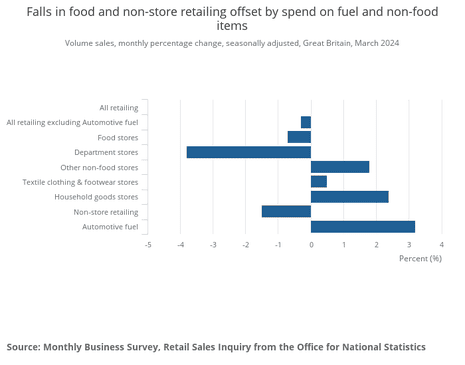British retail sale stagnate
Retail sales across Britain stalled in March, as the cost of living squeeze continues to hit spending, new data shows.
The Office for National Statistics has just reported that British retail sales volumes stagnated in March, following modest growth of just 0.1% in February (revised up from stagnation).
That’s weaker than expected; economists polled by Reuters had expected sales growth of 0.3% in March.
While spending on motor fuel and non-food goods rose, there was a drop in spending at department stores, on food, and online.

On an annual basis, sales volumes rose 0.8% over the year to March 2024, weaker than the 1% expected.
That leaves them 1.2% below their pre-Covid-19 level in February 2020.
ONS senior statistician Heather Bovill says:
“Retail sales registered no growth in March. Hardware stores, furniture shops, petrol stations and clothing stores all reported a rise in sales. However, these gains were offset by falling food sales and in department stores where retailers say higher prices hit trading.
“Looking at the longer-term picture, across the latest three months retail sales increased after a poor Christmas.”
Key events
Airline shares fall as geopolitics takes centre stage
Falling airline shares are dragging European stock markets to their lowest level in a month this morning.
The main airlines are mainly lower this morning, hit by the higher oil price (which pushes up fuel costs) and fears of travel disruption if the Middle East conflict escalates.
Here’s the situation presently:
Kathleen Brooks, research director at XTB, says geopolitics are taking centre stage in the markets again:
Nearly a week to the day when Iran sent drones and missiles into Israel, Israel has retaliated and sent a missile into Iran. The initial reports caused a large uptick in the oil price. Brent crude jumped nearly $4 per barrel on the news above $90 per barrel, but it has since retreated as the details about the extent of the attack emerge.
The missiles struck targets in Western Iran, and no nuclear sites have been damaged. Air space around Iran had been closed, but reports say it is now back open. Thus, we can assume this will not be a barrage of attacks and instead a one punch retaliation for Iran’s move last Saturday. As Jeremey Bowen of the BBC put it, the clandestine war between the two foes is now out in the open. So far, the attacks have been restrained, which is causing some relief to markets. However, the risk premium across asset prices is likely to rise as the future remains unclear. Will Iran and Israel leave each other alone now that they have had their tit-for-tat reprisals? Or does this continue, with well-planned ‘attacks’ that are designed to cause the least amount of civilian damage and are more a show of what could be possible?
While this is obviously preferable to an all-out war, it is a risky strategy. One mistake that causes casualties or hits an unexpected target could trigger an escalation in reprisals and a deeper, more dangerous situation in the Middle East. This is why volatility is likely to stick around, especially as it comes at a delicate time for financial markets as they recalibrate expectations for interest rate cuts.
Although European stock markets certainly aren’t in a full-blooded plunge, yet anyway, the main indices are all in the red – following losses across Asia overnight (see 7.21am).
The European Stoxx 600 is at a one-month low, as investors fret about events in the Middle East.
Here’s the situation in early trading:
-
FTSE 100: -36 points or -0.46% at 7842 points
-
Germany’s DAX: -152 points or -0.9% at 17,681 points
-
France’s CAC: -45 points or -0.6% at 7,976 points
-
Italy’s FTSE MIB: -345 points or -1% at 33,533 points
-
Wall Street is heading for losses when it opens in four hours, too, with the S&P 500 down 0.5% in pre-market trading.
Richard Hunter, head of markets at interactive investor, says:
“Asian markets bore the brunt of the breaking news of a retaliatory attack on Iran by Israel, also sending Dow futures sharply lower and resulting in further spikes in gold and oil prices.
US markets will not have the opportunity to react directly to the developments until later, but the escalation will put pressure on the main indices, which were already lining up for a weekly drop. The Dow Jones managed a wafer-thin gain on Thursday, whereas the Nasdaq and S&P500 continued on a downward trend which is eroding the heady gains made over recent months.
In the year to date, the Dow has now added just 0.2%, the Nasdaq 3.9% and the S&P500 5% as interest rate concerns continue to weigh on investor sentiment.
Gas prices have jumped this morning, with the UK month-ahead contract up 1.9% to 82.7p per therm.
Airline shares drag FTSE 100 down
Shares are dipping in Europe as traders digest events in the Middle East overnight.
In London, the FTSE 100 blue-chip share index is down 38 points or 0.5% at 7838 points.
IAG, the parent company of British Airways, is the top faller, down almost 4%, followed by easyJet (-2.5%).
Engineering firm Rolls-Royce, which makes and services jet engines, are down 1.7%.
European markets are also lower, with the pan-European Stoxx 600 down 0.6%.
Retail recession is over, says Capital Economics
Although sales volumes (the amount of stuff people bought) were flat in March, the first quarter of 2024 has been a brighter time for retailers than the last quarter of 2023.
Sales volumes increased by 1.9% in the three months to March 2024 when compared with the previous three months, the ONS reports.
That brings the retail recession to an end, declares Capital Economics this morning.
Alex Kerr, their assistant economist, explains:
Despite the softer-than-expected data, retail sales still added almost 0.1 percentage points to real GDP growth in Q1. Moreover, the prospect of interest rate cuts and the boost to real household incomes, from falling inflation and the 2p cut to national insurance in April, suggest the recovery in consumer spending will continue throughout this year.
Automotive fuel sales volumes rose to their highest level since May 2022 in March, today’s retail sales report shows.
Retailers told the ONS this rise was linked to increased footfall on their forecourts.
March’s retail sales stagnation is “disappointing”, says Nicholas Hyett, Investment Manager at Wealth Club, commented:
“Retailers had a gloomier March than many expected, and overall sales remain 1.2% below their pre-covid peak.
Department stores remain an area of particular weakness, not good news for John Lewis which announced it would not be paying its regular staff bonus for the second year in a row during the month. However, high street shops more broadly have actually performed better, it’s food retail and online shopping that have held back growth.
The disappointing numbers will fuel speculation that the Bank of England will consider interest rate cuts this summer, though are not poor enough to necessitate a move.
British retail sale stagnate
Retail sales across Britain stalled in March, as the cost of living squeeze continues to hit spending, new data shows.
The Office for National Statistics has just reported that British retail sales volumes stagnated in March, following modest growth of just 0.1% in February (revised up from stagnation).
That’s weaker than expected; economists polled by Reuters had expected sales growth of 0.3% in March.
While spending on motor fuel and non-food goods rose, there was a drop in spending at department stores, on food, and online.
On an annual basis, sales volumes rose 0.8% over the year to March 2024, weaker than the 1% expected.
That leaves them 1.2% below their pre-Covid-19 level in February 2020.
ONS senior statistician Heather Bovill says:
“Retail sales registered no growth in March. Hardware stores, furniture shops, petrol stations and clothing stores all reported a rise in sales. However, these gains were offset by falling food sales and in department stores where retailers say higher prices hit trading.
“Looking at the longer-term picture, across the latest three months retail sales increased after a poor Christmas.”
S&P cuts Israel’s credit rating on heightened geopolitical risk
Last night, ratings agency S&P Global lowered Israel’s credit rating, before the reports of explosions in Iran.
S&P cut Israel’s long-term ratings to A-plus from AA-minus, citing Heightened Geopolitical Risk, and left its outlook on negative.
S&P says:
“We forecast that Israel’s general government deficit will widen to 8% of GDP in 2024, mostly as a result of increased defense spending”
S&P Global predicts that a wider regional conflict will be avoided, but that the Israel-Hamas war and the confrontation with Hezbollah appear set to continue throughout 2024.
Asia-Pacific stock markets are a sea of red today, after Israel carried out military operations against Iran.
Japan’s Nikkei share index has shed 2.3%, or 883 points, to 37,196, away from the record high set last month.
China’s CSI 300 is off 0.8%, and South Korea’s KOSPI is down 1.9%.
Introduction: Oil jumps after Iran explosions
Good morning, and welcome to our rolling coverage of business, the financial markets and the world economy.
Reports of powerful explosions in Iran overnight have pushed up the oil price, as investors fear escalation in the Middle East crisis.
Brent crude surged back over $90 amid reports of explosions near the Iranian city of Isfahan, with US officials confirming that Israel has carried out military operations against Iran.
Oil jumped on fears that the conflict had entered a new phase, while stocks fell.
Stephen Innes, managing partner at SPI Asset Management, says:
Reports of an Israeli aerial bombardment targeting a key nuclear facility in central Isfahan have sparked a significant shift out of risk assets and into safe-haven investments.
Metal and soft commodity prices – such as wheat, soybeans and corn – also rose, on fears of shipping disruption and higher energy input costs.
Higher oil and food prices, and shipping costs, would add to inflation, undermining efforts to bring the cost of living crisis under control.
But… markets are calming down somewhat, with Brent crude now easing back to $89/barrel (up 2% today) as Iran appears to play down the incident.
Oil and gold prices coming down
👉 “Contrary to the rumors and claims made by the Israeli media on Friday morning, there are no reports of an attack from abroad on Iran’s central city of Isfahan or any other part of the country,” Iran’s semi-official Tasnim reports
— Stephen Stapczynski (@SStapczynski) April 19, 2024
A senior commander of Iran’s Army Siavosh Mihandoust has said that no damage was caused in the overnight attack, according to state TV, adding that the noise heard overnight in Isfahan was due to air defence systems targeting a “suspicious object”.
Diplomat Carl Bildt, co-chair of the European Council on Foreign Relations, says this is important, and that the key is to break the dangerous cycle of escalation.
Whether there was a large 🇮🇱 attack or not isn’t particularly relevant – important is that 🇮🇷 is playing down the reports. Key now is to break the dangerous cycle of escalation. https://t.co/h8TqFmKn8O
— Carl Bildt (@carlbildt) April 19, 2024
Our brilliant Middle East Crisis liveblog has all the details:
Also coming up today
Some lenders to Thames Water are facing the prospect of losing up to 40% of their money if the troubled supplier is nationalised, with much of its £15.6bn debt ending up on the public books.
EXC: The secret Whitehall blueprint for Thames Water’s renationalisation:
– bulk of £15.6bn debts go on state balance sheet
– some lenders to lose 35-40% of £
– new public corporation takes ownership, based on Crossrail
– equity wiped outBy @Annaisaac https://t.co/3oRjheFnQf
— John Collingridge (@jmcollingridge) April 18, 2024
The Guardian revealed last night that a government blueprint, codenamed Project Timber, is being drawn up; it would turn Britain’s biggest water company into a publicly owned arm’s-length body.
Some lenders to its core operating company could lose up to 40% of their money under the plans, which which is at an advanced stage. More here:
There’s also excitement in the crypto currency world, where bitcoin is about to undergo a halving. This will cut the rewards for bitcoin miners in half, to reduces the pace at which new bitcoins enter the market.
The agenda
-
7am BST: UK retail sales for March
-
2pm BST: IMF/World Bank Spring Meeting continues in Washington DC
-
3.15pm BST: Bank of England deputy governor Dave Ramsden on panel about lessons to learn from post-pandemic inflation







